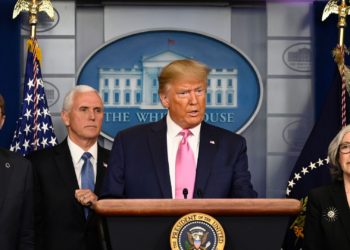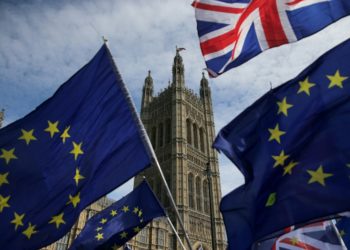British Prime Minister Theresa May fought for survival Tuesday as parliament began charting its own Brexit way forward and her vital Northern Irish coalition partners denounced her existing deal.
Lawmakers, exasperated by Britain’s failed efforts to split from the European Union after three years of debates and negotiations, voted Monday to give themselves a broader say on what happens next.
The motion creates parliamentary time for MPs to come up with their own proposals that could help stave off a chaotic “no-deal” divorce in two weeks.
Blunt Warning
May’s temporary loss of control was followed Tuesday by a blunt warning from the Democratic Unionist Party (DUP) – the hardline Northern Irish power brokers who prop up the government.
The group’s Brexit spokesman Sammy Wilson wrote in The Daily Telegraph that the DUP “will not vote for an unamended or unchanged version” of the deal May struck with Brussels at the end of last year.
Wilson added that the party would stick to its position “even if we are forced into a one-year extension” of the current Brexit deadline of April 12.
His comments considerably dampen May’s hopes of getting her twice-rejected agreement through parliament on the third attempt in the coming days.
British lawmakers seize #Brexit control for a day pic.twitter.com/DeVAGiOkEF
— Reuters (@Reuters) March 26, 2019
May herself admitted “with great regret” Monday that there was “still not sufficient support in the House to bring back the deal.”
Clean Slate
Parliament’s grab for power was spearheaded by europhiles who want to either reverse Brexit or preserve much closer economic ties with the remaining 27 E.U. states.
They represent the views of roughly half the voters in a deeply divided country that is still coming to terms with the outcome of the 2016 Brexit vote.
No one is entirely sure how parliament will approach its new role in the week the 46-year partnership was scheduled to have ended.
The agenda submitted to parliament Tuesday would see MPs first pick through an array of choices on Wednesday.
Parliament would then pick through the highest vote-getters at another session planned for Monday.
The bigger worry for May is a mooted plan for MPs in the following days to take an even firmer grip of the Brexit agenda by passing legislation that forces the government’s hand.
Parliament’s initial votes will be non-binding instructions that only carry political weight.
May has already signaled that she might ignore them if they contradict her Conservative party’s 2017 election platform.
https://twitter.com/SebastianEPayne/status/1110308049015709696
It included a vow to take Britain out of the E.U. customs union and single market – the two vast organizations that open borders and regulate trade across most of the European continent.
Conflicting Messages
Parliament is now effectively re-considering how to go about Brexit all over again.
Everything is back on the table and May’s deal is just one of a half-dozen or so approaches that may be up for debate.
May’s efforts to bring onside anti-E.U. rebels in her own party have been fruitless despite months of talks.
But there are some hints that the current political shift could be scaring some of the holdouts into line.
Fierce Brexit proponent Jacob Rees-Mogg – who heads the influential European Research Group (ERG) wing of May’s party – conceded on a political podcast Tuesday that “Mrs. May’s deal is better than not leaving at all.”
“Securing the backing of a high profile ERG member like Rees-Mogg – albeit reluctantly – could dramatically improve May’s numbers,” said Oanda trading house analyst Craig Erlam.
“It’s now just a question of whether it’s too little too late.”
The conflicting messages from Rees-Mogg and the DUP underscore the myriad of competing interests May has to weigh as she cobbles together the votes needed to finally get Brexit done.
The government hinted that May might try her luck in parliament for a third time on Thursday.
Britain would leave the E.U. on May 22 if parliament passes May’s original deal.
More on the Subject
Britain faces a “national emergency” as the risk of a no-deal Brexit rises, business and union leaders warned in an open letter to embattled Prime Minister Theresa May.





















